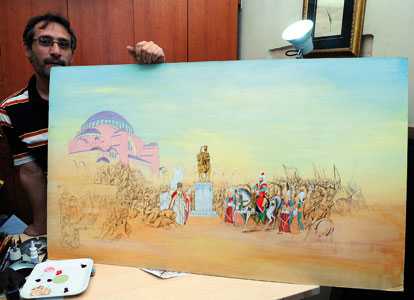ISTANBUL – Anatolia News Agency
One Turkish artist is celebrating the May 29, 1453, conquest of Constantinople with a miniature depicting the event. Özcan Özcan’s painting depicts Mehmed the Conqueror’ first entry into the Hagia Sophia after he took the Byzantine capital. Özcan believes that miniatures are one of the highest forms of art as they seize the depths of the imagination

Using his artistic skills to reach people, a Turkish miniaturist has been working on a new painting of Mehmed the Conqueror’s conquest of Istanbul.
“I aimed to reflect the spirit of the conquest,” miniaturist Özcan Özcan said of the work he started to compose two months ago. “I did it to make our people experience that moment and to offer more knowledge. I tried to fulfill the mission of art. You can only convey people’s spirit through art.”
Sunday marked the 558th anniversary of the fall of Constantinople to the Turkish army led by 21-year-old Mehmed the Conqueror. After a two-month siege, the Turks took the Byzantine capital on May 29, 1453.
The conquest of Istanbul was a huge historic event initiating the transformation of the Ottoman state into an empire, the fall of the Byzantium Empire and marked the end of the Middle Ages and the beginning of the New Age, Özcan said. “But there is not much about this in art history. This is sad for me.”
“In my piece, I composed Mehmed the Conqueror’s first entry in to the Hagia Sophia, what kind of a reaction there would be and the culture of the location. I tried to portray that Fatih had a very strong soul. What was important for me was being able to depict the spirit of the conquest and create something that people could hang on their walls,” Özcan said.
The miniaturist depicts the sultan’s first prostration in prayer at the Hagia Sophia in his work.
“Whether such a thing has happened or not, I don’t know. But everybody has such a view in their minds,” Özcan said. “The conqueror, who was dreaming of conquering Istanbul at age 21, was prostrating over there as if reuniting with a lover. For example, in that prostration, you cannot see anybody’s face or the conqueror’s face. You can only tell he is the conqueror because of what is seen on his sword. This is what I am trying to achieve. I want to meld people with the aura over there. Not with the conqueror. We are in need of this.”
In a previous work, Özcan depicted the Kaaba in Mecca with a miniature after a period of study lasting 2.5 years.
Miniatures give artists freedom
“Miniatures are the peak of the art of painting. The utmost point that an art leads to is the place it started at. I accept the first cave paintings of humanity as miniatures because they are products of imagination. Miniatures seize the depths of the imagination,” Özcan said.
During the Ottoman era, miniatures were always based on selected topics whereas in the Republican era, this has been ignored, Özcan said.
Özcan, who was born in 1970 in the western Black Sea province of Zonguldak, has participated in joint and solo art exhibitions and continues to organize courses and exclusive lessons to teach miniature art.
Özcan said the rules surrounding the production of miniature art were largely free. “Miniature art does not cover the rules of paintings. You can see what you want and draw what you want.”
Noting that it was also possible to give dimensions and depth in miniature art works, Özcan added that the type of painting was the starting point of all other painting trends and artistic movements.

Leave a Reply